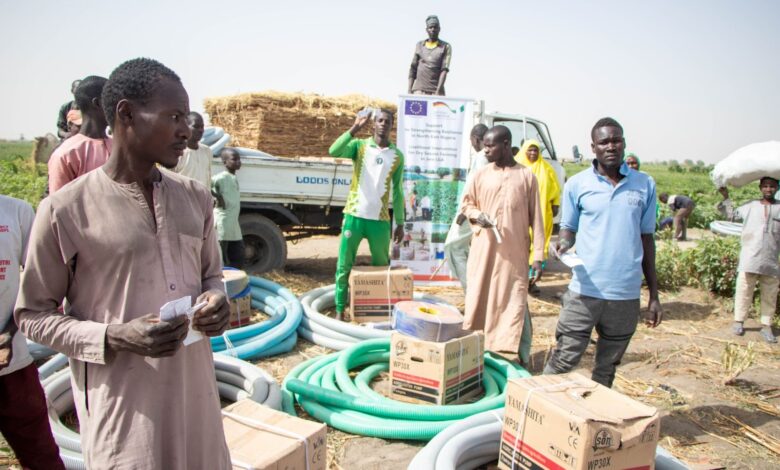Displaced Borno Farmers Receive Support To Farm Again
Under the Support to Strengthening Resilience in Northeast Nigeria project, the NRC is reaching 1,673 displaced people in Borno State with seeds and irrigation support ahead of the planting season.

At least 1,673 farmers displaced by the insurgency in Borno State, Northeast Nigeria, have benefited from an intervention by the Norwegian Refugee Council (NRC).
Rounding off the six-month intervention in Maiduguri, Borno’s capital, on Wednesday, May 25, Tonny Villy, the NRC Area Manager, Area North office, said the project was necessary to scale up livelihood supports to those whose lives have been upended by the decade-long Boko Haram insurgency in the region.
The NRC, in a statement, said it provided 833 farmers with farming kits such as certified seeds, organic liquid fertiliser, knapsack sprayer, personal protective equipment, water pumps, and hoses that will help enable them to access water all year round and support their irrigation farming.
Additional 840 farmers were trained and given start-up cash grants to support income-generating activities in areas including livestock, processing and selling of rice, and petty trading of household and food items. Others were able to rent a shop and buy tools and machines to utilise their existing skills such as tailoring, carpentering and hairdressing.
The recipients were selected from across five local government areas of Borno State, namely: Biu, Hawul, Askira Uba, Jere, and MMC.
“There is a need to create new jobs and employment opportunities for internally displaced persons (IDPs) and their hosts, especially within communities that rely on agriculture. Income-generating activities can help to improve economic opportunities for both groups,” Villy said.
The intervention was co-funded by the European Union (EU) and the German Federal Ministry for Economic Cooperation and Development (BMZ) under the Support to Strengthening Resilience in Northeast Nigeria project.
It is expected to help displaced people grow food all year round and set up businesses that will help them support their families in the months and years to come.
With more than 80 per cent of the region’s rural population depending on crop or livestock farming, investing in agriculture is critical to tackling food insecurity, according to the Food and Agriculture Organization of the United Nations (FAO).
“Life here is not easy. We cannot afford to buy food,” Gidew Kamsulum, 37, a resettled IDP in the Jere area of Borno, told HumAngle.
As the lean season approaches, IDPs in parts of Borno State are likely to slide into Catastrophic (IPC Phase 5) outcomes of food insecurity in the latter half of 2022. Humanitarian actors are concerned that the situation may remain bleak as funding dwindles.
The UN with its partners is seeking $1.1 billion but only $200m has been covered so far. $58.95 million is required for early recovery and livelihoods and$450.89 million for food security.
Support Our Journalism
There are millions of ordinary people affected by conflict in Africa whose stories are missing in the mainstream media. HumAngle is determined to tell those challenging and under-reported stories, hoping that the people impacted by these conflicts will find the safety and security they deserve.
To ensure that we continue to provide public service coverage, we have a small favour to ask you. We want you to be part of our journalistic endeavour by contributing a token to us.
Your donation will further promote a robust, free, and independent media.
Donate HereStay Closer To The Stories That Matter




